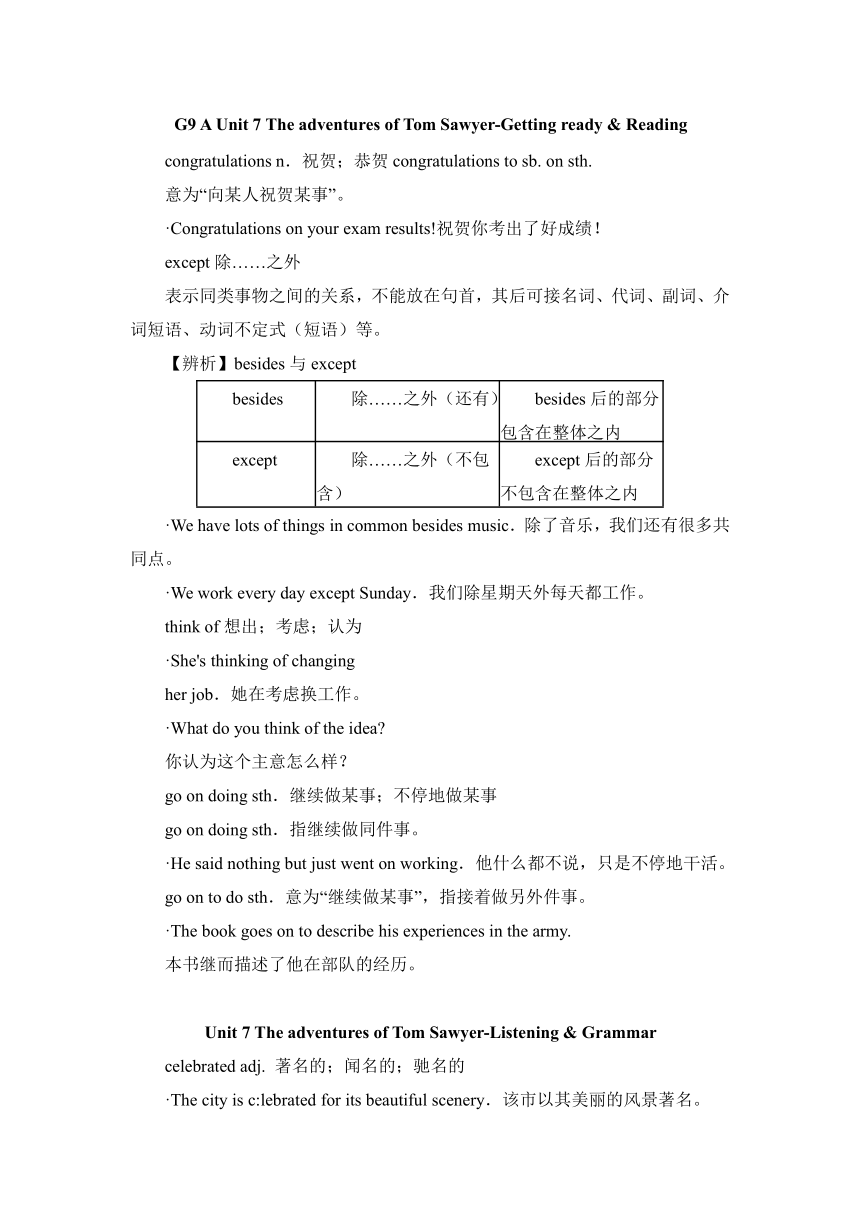
G9 A Unit 7 The adventures of Tom Sawyer-Getting ready & Reading congratulations n.祝贺;恭贺congratulations to sb. on sth. 意为“向某人祝贺某事”。 ·Congratulations on your exam results!祝贺你考出了好成绩! except除……之外 表示同类事物之间的关系,不能放在句首,其后可接名词、代词、副词、介词短语、动词不定式(短语)等。 【辨析】besides与except besides 除……之外(还有) besides后的部分包含在整体之内 except 除……之外(不包含) except后的部分不包含在整体之内 ·We have lots of things in common besides music.除了音乐,我们还有很多共同点。 ·We work every day except Sunday.我们除星期天外每天都工作。 think of想出;考虑;认为 ·She's thinking of changing her job.她在考虑换工作。 ·What do you think of the idea 你认为这个主意怎么样? go on doing sth.继续做某事;不停地做某事 go on doing sth.指继续做同件事。 ·He said nothing but just went on working.他什么都不说,只是不停地干活。 go on to do sth.意为“继续做某事”,指接着做另外件事。 ·The book goes on to describe his experiences in the army. 本书继而描述了他在部队的经历。 Unit 7 The adventures of Tom Sawyer-Listening & Grammar celebrated adj. 著名的;闻名的;驰名的 ·The city is c:lebrated for its beautiful scenery.该市以其美丽的风景著名。 ①celebrate作及物动词,意为“庆祝;颂扬”。 ·How do people celebrate New Year in your country 你们国家的人怎样庆祝新年? ②celebration可用作可数名词,意为“庆祝活动;庆典”。 ·Her triumph was a cause for celebration.她的胜利是庆祝的理由。 fight v.搏斗;打斗 fight的过去式、过去分词分别为fought,fought。 ·My little brothers are always fighting.我的弟弟们总是在打架。 【拓展】 ①fight against sb.意为“与某人作战”。 ·My grandfather fought against the Fascists in Spain.我的祖父曾经在西班牙与法西斯分子作战。 ②fight用作可数名词,意为“争论;争吵”,常构成短语have a fight with sb.“与某人争吵/争辩”。 ·Did you have a fight with him 你和他争辩了? 定语从句中只能用that引导而不能用which引导的情况 ①先行词为all,anything,something, nothing, everything, little, none等或被这些词修饰时。 ·All the people that are present burst into tears.所有到场的人都突然大哭起来。 ②先行词被序数词修饰时。 ·This is my first time that I have seen her.这是我第次见她。 ③先行词被形容词最高级或the only,the very等修饰时。 ·Mr Smith is the only foreigner that he knows.史密斯先生是他认识的唯一一个外国人。 ④先行词同时含有“人”和“物”时。 ·The writer and his novel that you have just talked about are really well-known. 你刚才谈起的那位作家以及他的小说确实很著名。 Unit 7 The adventures of Tom Sawyer-Speaking& Writing What's new 有什么新鲜事吗 ·So what's new here 那么,有什么新鲜事吗? Two things,I think. 我认为有两个。 ·What's new today 今天有什么新鲜事吗? mainly adv. 首要地;主要地其形容词形式为main,意为“主要的;首要的”。 ·They eat mainly fruit and nuts. 他们主要吃水果和坚果。 ·Poor housing and unemployment are the main problems. 住房条件差和失业是主要问题。 pretend v.假装;佯装 ·We pretended (that) nothing had happened. 我们假装什么事情也没发生。 ·He pretende ... ...
~~ 您好,已阅读到文档的结尾了 ~~